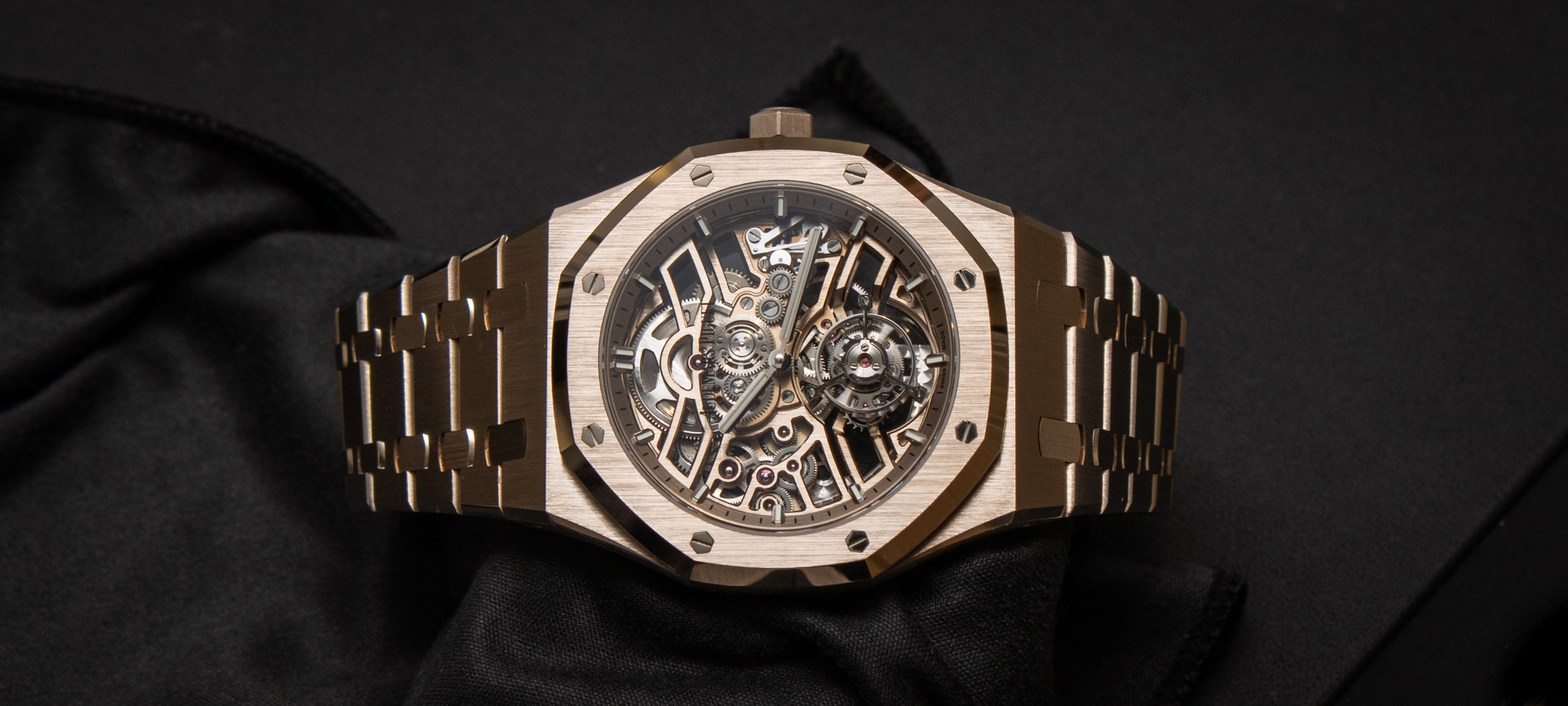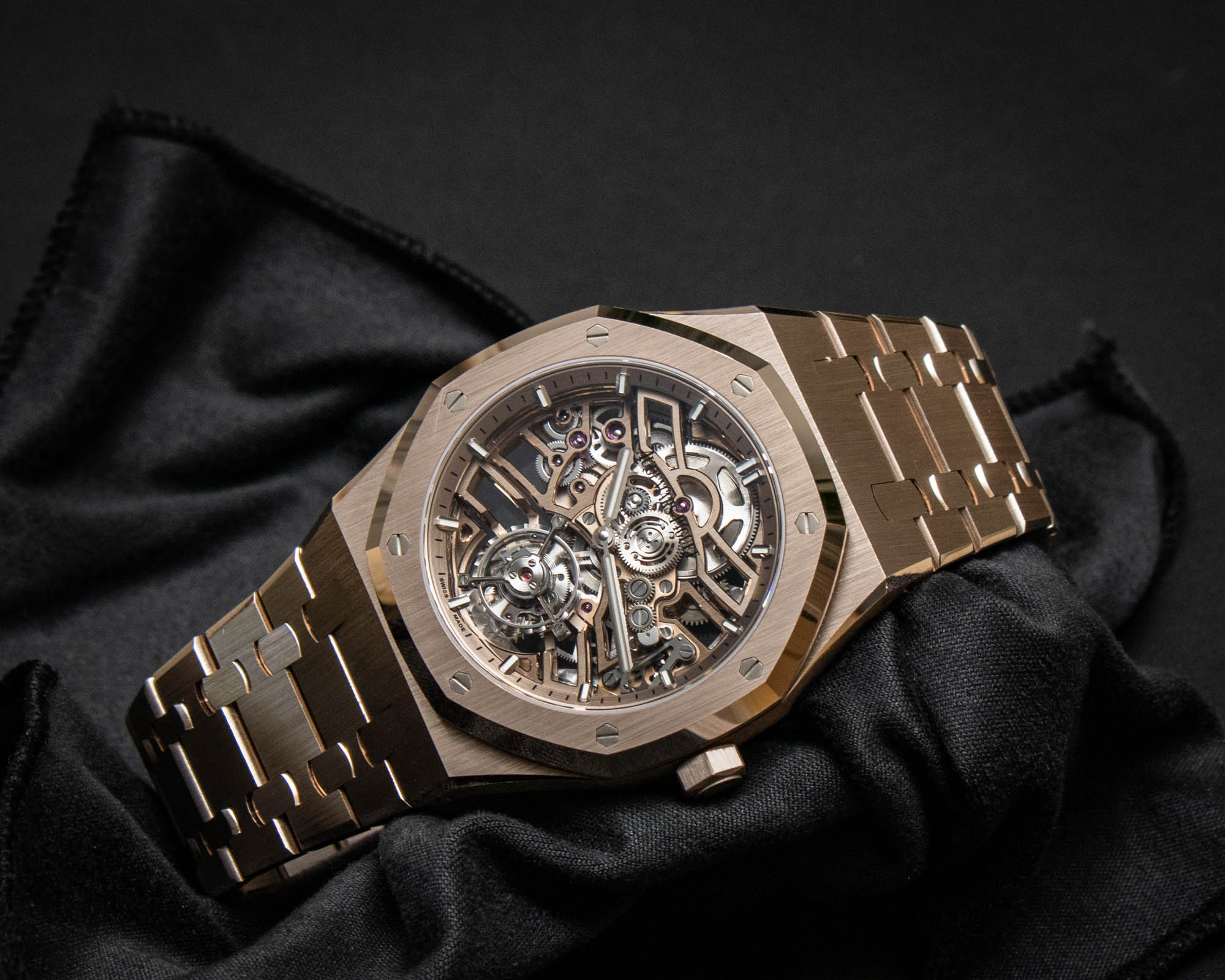
While there is certainly an argument to be made that some of the watch industry’s proprietary gold alloys are little more than materials-based marketing gimmicks, it’s also undeniable that some of the more innovative options offer truly unique properties, and a perfect example of this is the new 18k “sand gold” alloy from Audemars Piguet. Last month, the famous Swiss luxury manufacturer debuted this novel alloy in the recently announced Audemars Piguet Royal Oak Selfwinding Flying Tourbillon Openworked, and I had the opportunity to check out this new model at AP House Los Angeles, which is the brand’s Hollywood lounge and penthouse retail space.

You can find our original news story about the Audemars Piguet Audemars Piguet Royal Oak Selfwinding Flying Tourbillon Openworked in sand gold (ref. 26735SG.OO.1320SG.01) right here, and since this model already existed in stainless steel, the new 18k sand gold alloy is the real headline of this launch, with this release representing the first time that this material has appeared within the brand’s catalog. With that in mind, we are still talking about a skeletonized flying tourbillon in solid gold from one of the world’s premier luxury manufacturers, so the watch itself is properly impressive, both in terms of its visual presence and physical weight, as both its case and bracelet are crafted entirely from the brand’s new 18k sand gold alloy.

In regards to the watch itself, the new Audemars Piguet Royal Oak Selfwinding Flying Tourbillon Openworked is essentially the sand gold version of the stainless steel model that debuted in 2022 for the Royal Oak’s 50th anniversary. Consequently, you get the Royal Oak collection’s instantly-recognizable octagonal case in a 41mm format that measures 10.6mm thick, along with a signed crown at 2 o’clock, flat anti-reflective sapphire crystals fitted to both the dial side of the watch and its display caseback, plus 50 meters of water resistance to protect against daily moisture contact. Similarly, attached to the case is the Royal Oak’s signature integrated bracelet (also crafted entirely from sand gold), and the various components are finished with the collection’s usual variety of coarse brushed surfaces and high-polished bevels.

At its core, the new sand gold Audemars Piguet Royal Oak Selfwinding Flying Tourbillon Openworked is very much still a Royal Oak, and its angular case and integrated bracelet offer an appearance that is instantly recognizable from across the room. Although the watch itself is incredibly impressive and well-executed, the Royal Oak is such a familiar design that it’s hard for me to personally get excited about new models, even when they are truly beautiful and outstanding creations. That said, I still always geek out when brands introduce new materials, and Audemars Piguet’s sand gold alloy offers an appearance that is tangibly different from any of the other types of gold currently found within the brand’s modern catalog.

Named after the appearance of sand dunes in the desert sunlight, the overall color of sand gold is noticeably colder and less pink compared to the standard rose gold that can be found elsewhere within the Royal Oak collection. The warm yet muted hue of the metal sits somewhere between white and rose gold with a unique color that offers a different appearance depending on the lighting. Rather than just being a lighter shade of pink, Audemars Piguet’s sand gold alloy actually appears darker than normal rose gold, and it offers an unusual yet restrained color that could best be described as a metallic shade of taupe.
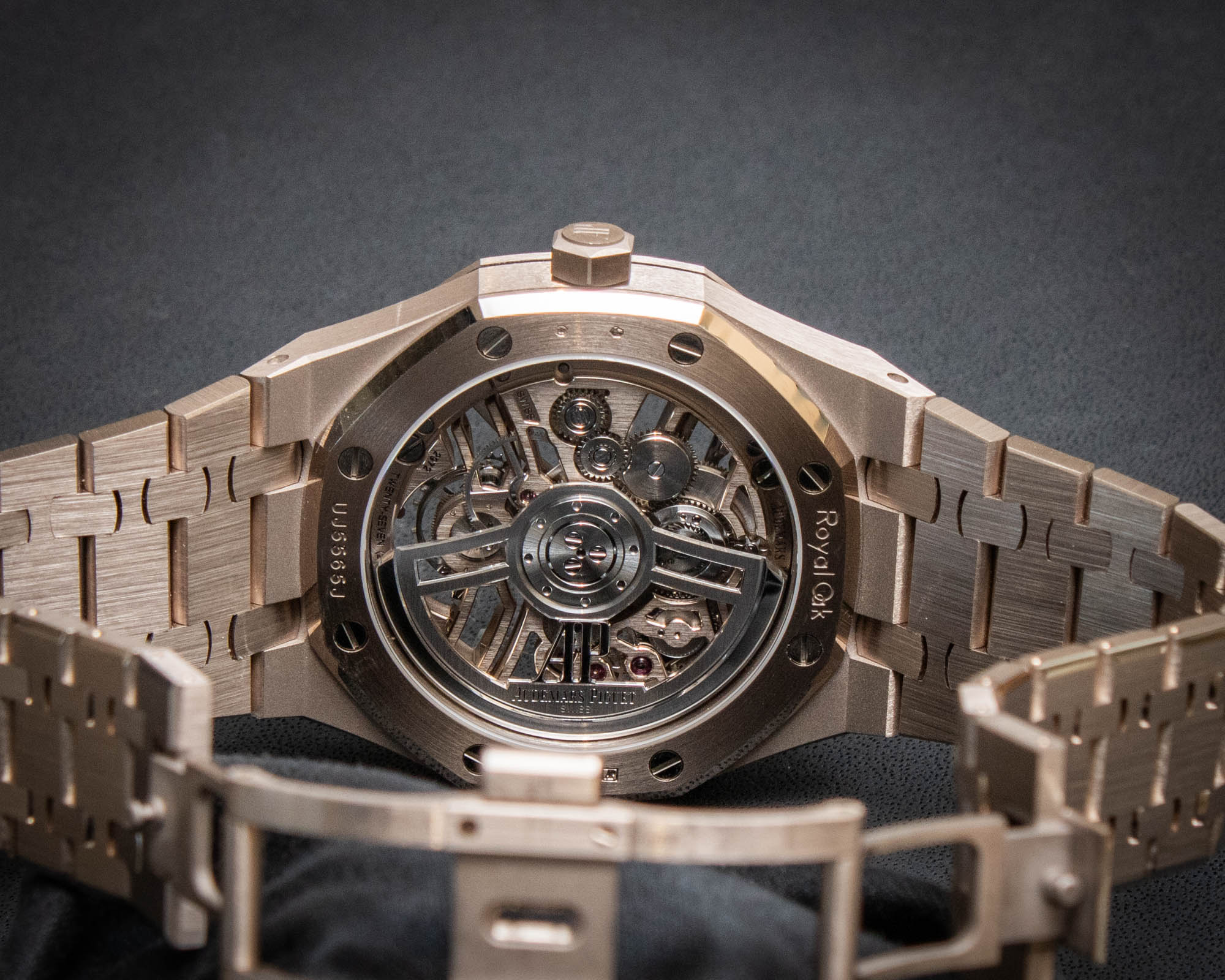
Similar to the vast majority of other types of gold used throughout the watch industry, Audemars Piguet’s sand gold is an 18k alloy, which means that 75% of the material consists of pure gold. In its elemental form, pure gold (24k) is too soft to be used for watch cases or jewelry, and so the other 25% of an 18k gold alloy consists of other metals that increase its strength and durability. With that in mind, the color of these gold alloys can be influenced by the other metals that account for the remaining 25% of their composition, and traditional rose gold is produced by mixing in copper and silver, along with small amounts of other elements to help fine-tune its color and improve longevity.
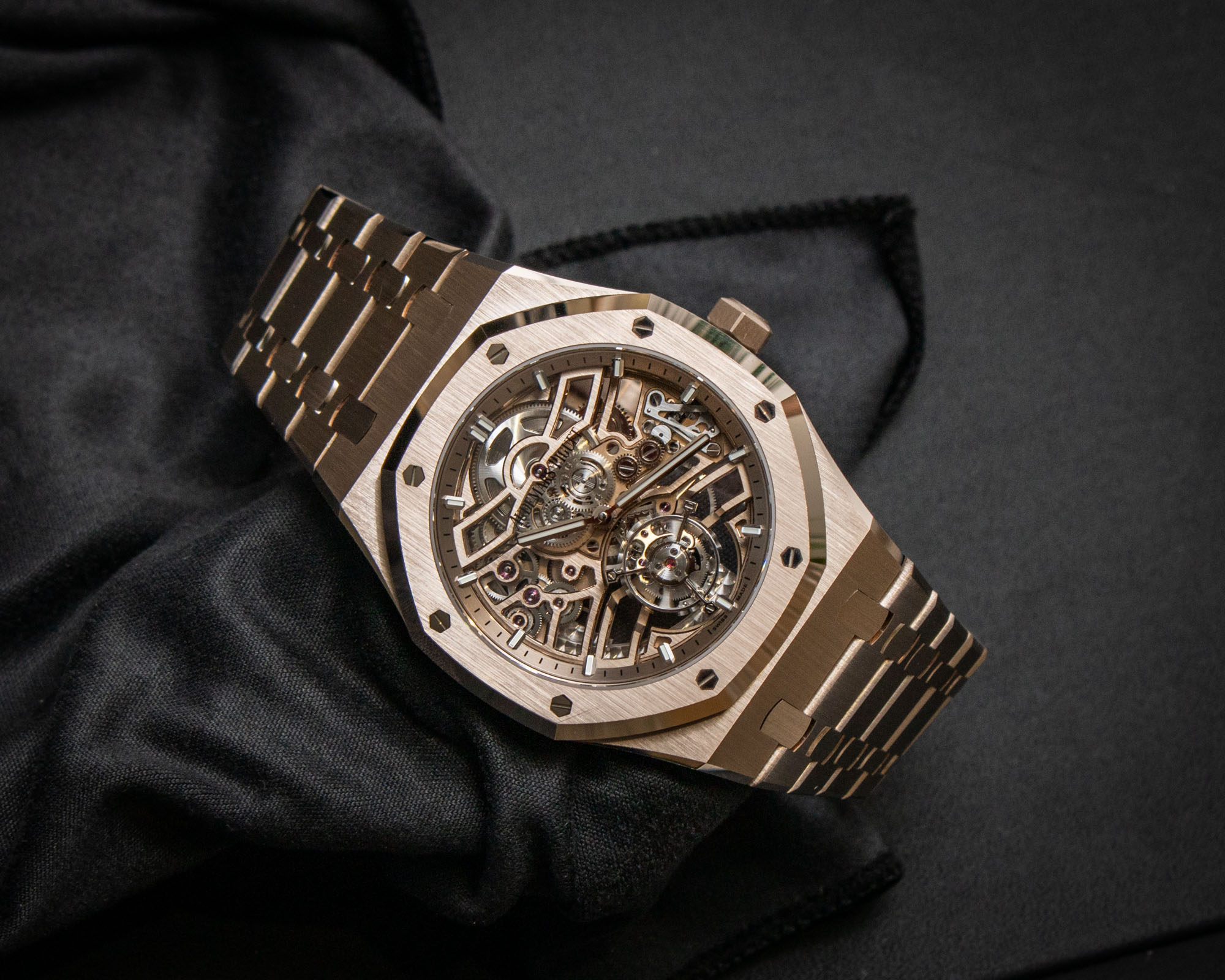
To achieve the unique appearance of sand gold, Audemars Piguet uses less copper than what is required for traditional rose gold, although it also swaps out the silver for a significantly higher percentage of palladium, and the resulting alloy has an appearance that is both darker and colder than standard 18k rose gold, while simultaneously benefiting from an incredibly lustrous quality. Personally, I don’t find Audemars Piguet’s new sand gold alloy to be quite as elegant or beautiful when compared directly to traditional yellow or rose gold. However, I also found the warm yet dark appearance of the metal to be rather captivating, and it immediately stands out when you see it next to a regular rose gold watch.

Fully visible through both the open-worked dial and display caseback of the sand gold Audemars Piguet Royal Oak Selfwinding Flying Tourbillon Openworked is the brand’s manufacture 2972 automatic movement, which runs at a frequency of 21,600vph (3 Hz) with a power reserve of approximately 65 hours. Although this is the same movement that can be found inside the stainless steel version of the model, its plates and bridges have been updated to feature a sand gold galvanic treatment that matches its case. The rest of the movement’s components, including its skeletonized 22k pink gold rotor, are rhodium-plated to highlight the intricate mechanics of the watch, and this works together with the architectural symmetry of the Cal. 2972 to create a highly cohesive overall aesthetic.
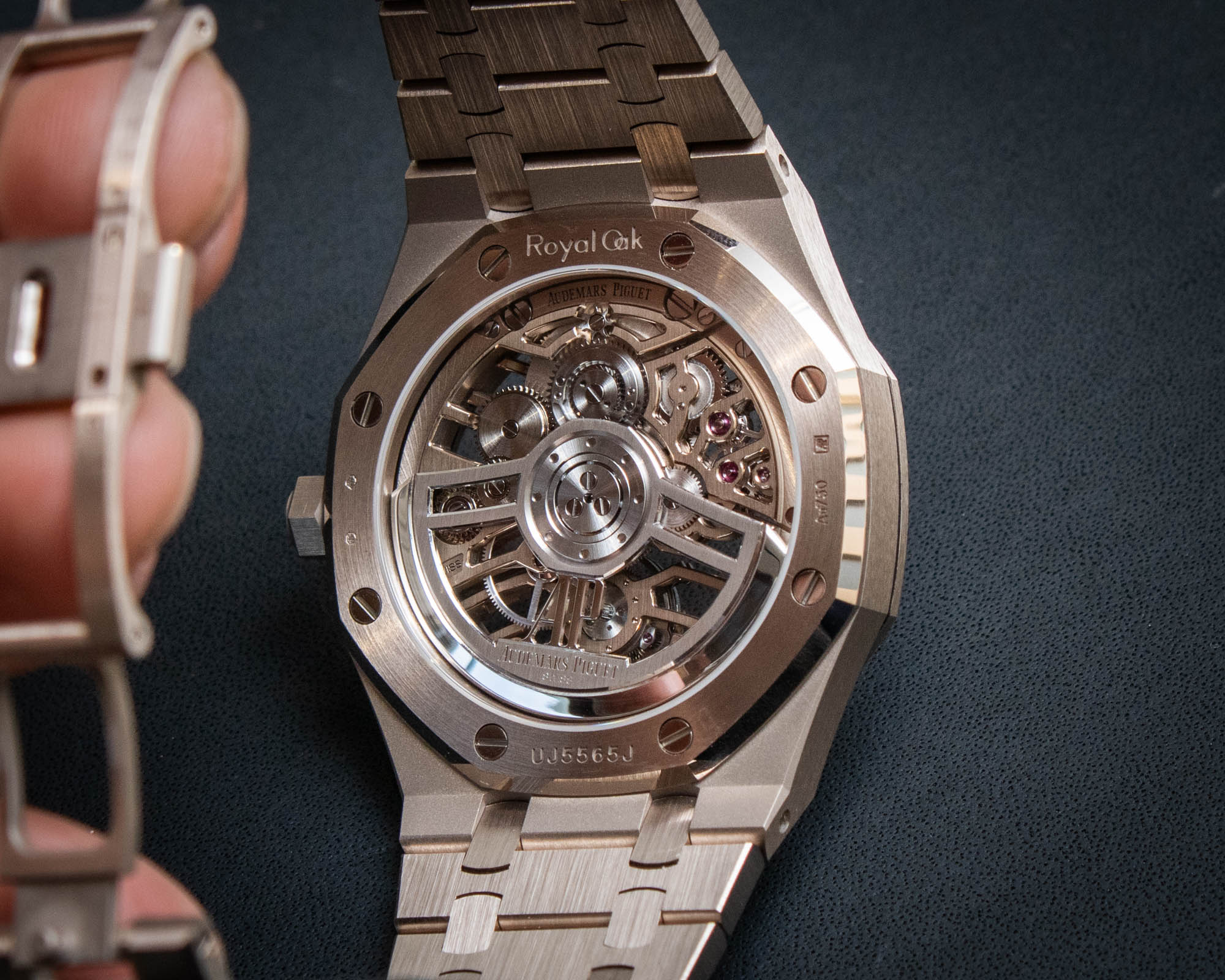
The Royal Oak’s angular case and integrated bracelet offer a significant amount of real estate to showcase Audemars Piguet’s new sand gold alloy, and just as you would expect from a six-figure watch made by one of the world’s most prestigious luxury manufacturers, everything about the Royal Oak Selfwinding Flying Tourbillon Openworked is executed to impossibly high standards. While this same model would likely be equally impressive had it been crafted from any other shade of gold, sand gold simply looks different from anything else currently available in Audemars Piguet’s modern lineup, and it serves as the perfect alternative for those who enjoy the warm hues of rose gold but want something a bit more understated that what you get from a traditional pink gold watch.

No one buys a skeletonized flying tourbillon on a solid gold bracelet with the intention of subtlety, and for those who truly want to stand out, the new sand gold Royal Oak Selfwinding Flying Tourbillon Openworked represents a truly compelling option (provided that you can afford its six-figure price tag). With an official retail price of 250,000 CHF, which equals approximately $276,000 USD (at the time of writing), the new Audemars Piguet Royal Oak Selfwinding Flying Tourbillon Openworked ref. 26735SG.OO.1320SG.01 costs roughly the same price as a condo or supercar; however, even among a sea of precious metal Audemars Piguet watches, the unique color of sand gold immediately stands out. Now, the big question that remains for prospective buyers is whether or not they actually prefer the warm and muted appearance of sand gold over any of the other shades of gold that are available within the industry, although it’s undeniable that the novel alloy offers a noticeably different appearance than sets this model apart from the rest of the band’s catalog. For more information on the Sand Gold Audemars Piguet Royal Oak Selfwinding Flying Tourbillon Openworked, please visit the brand’s website.

